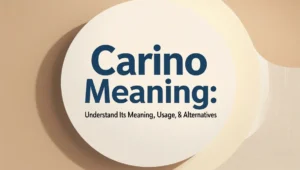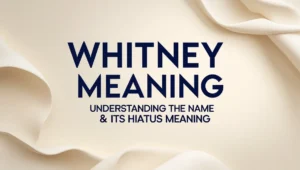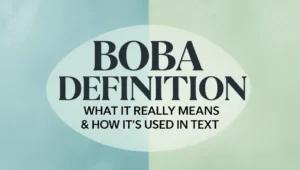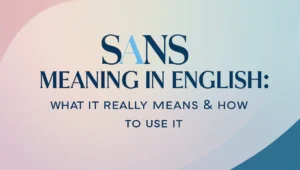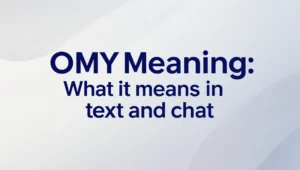If you’ve ever heard someone use the word carino and wondered what it truly means, you’re not alone. The carino meaning goes far beyond a simple translation—it carries emotion, warmth, and cultural nuance. Whether used in a romantic relationship, among family members, or casually between friends, carino is one of those Spanish words that resonates deeply. In this article, we’ll break down the true meaning of carino, explore how it’s used across different contexts, and share polite alternatives you can use in both formal and informal conversations. Whether you’re learning Spanish or simply curious about emotional expressions in other languages, this guide will help you understand when, why, and how to use carino appropriately.
What Does Carino Mean in Spanish?
At its core, the Spanish word carino (spelled cariño with a tilde over the “n”) means “affection,” “darling,” or “sweetheart.” It’s a noun that expresses affectionate feelings, whether romantic, friendly, or familial.
The root of the word comes from the Latin carus, meaning “dear” or “beloved.” Over time, it evolved into a deeply expressive term widely used in Spain and Latin America.
Depending on context, carino can mean:
- A romantic term like “baby” or “honey”
- A loving word used between parents and children
- A sign of fondness between close friends
- A warm, polite expression in casual conversation
It’s one of those rare words that can shift in meaning depending on tone, relationship, and culture.
Everyday Usage of Carino
The usage of carino is incredibly flexible. You’ll often hear it in conversations, love letters, WhatsApp messages, and even in customer service settings in countries like Spain or Mexico. It’s common to greet someone you care about with “Hola, cariño,” which translates to “Hi, sweetheart.” In writing, someone might end a note with “con mucho cariño,” meaning “with much affection.”
Let’s look at a few common scenarios where carino is used:
- Romantic relationships: A partner might say, “Te amo, cariño” (“I love you, darling”).
- Family settings: A mother might comfort her child with, “Tranquilo, cariño” (“Calm down, sweetheart”).
- Friendly situations: A friend might say, “Gracias, cariño” (“Thanks, love”) as a warm thank-you.
- Professional yet informal interactions: A barista or vendor might use it to sound friendly and engaging.
Its meaning doesn’t rely solely on the word itself but on how it’s said and who it’s said to.
Polite Alternatives to Carino
While carino is warm and endearing, it’s not always suitable for every situation. In formal settings or with people you’re not close to, using carino might come across as too personal or inappropriate. That’s where polite alternatives to carino come in handy.
Here are a few respectful and friendly substitutes:
- Amigo / Amiga – Meaning “friend,” this is perfect for casual yet respectful conversations.
- Querido / Querida – Meaning “dear,” this is ideal for letters and warm interactions.
- Estimado / Estimada – More formal, used in emails or professional correspondence.
- Señor / Señora – A very respectful term to address someone formally.
- Mi cielo / Mi vida – Slightly more poetic or emotional alternatives, used romantically.
Choosing the right word depends on the relationship and cultural setting. In professional emails, for example, starting with “Estimado Juan” instead of “Hola, cariño” is far more appropriate. Likewise, calling a coworker “cariño” might feel overly familiar unless you have a close bond or the cultural environment encourages warmth.
Cultural Insight: Where and When to Use Carino
One of the most beautiful aspects of the Spanish language is its emotional richness. In places like Spain, Colombia, and Mexico, expressing affection through language is the norm. Words like carino help soften speech and build closeness.
However, not all Spanish-speaking cultures use it the same way. In some regions, carino is strictly reserved for romantic or familial use, while in others, it might be thrown around casually with friends, customers, or even strangers.
For example:
- In Spain, it’s common to hear a waitress call a customer cariño as a friendly gesture.
- In Latin America, especially in more traditional areas, it’s more often used within family and romantic relationships.
It’s always important to read the social cues. When in doubt, default to more neutral terms and gradually adapt as you become more familiar with the context.
Quick Summary of Carino Meaning and Usage
- Carino means affection, sweetheart, or darling, depending on the context.
- It’s commonly used in romantic, friendly, or familial conversations.
- The tone and relationship matter—a lot.
- In formal settings, choose polite alternatives like Estimado, Querido, or Amigo.
- Cultural norms determine how freely or carefully carino should be used.
Unique FAQs About Carino
1. Is carino gender-specific? No, carino is gender-neutral. Some people playfully say cariña for females, but it’s not standard grammar.
2. Can I say carino to someone I just met? It depends on the culture. In Spain, yes, casually. In formal settings or with strangers, it’s better to wait.
3. What’s the difference between carino and mi amor? Mi amor is typically more romantic and intimate. Carino can be affectionate without being romantic.
4. Can I use carino in professional emails? Generally no. It’s too informal. Use Estimado/Estimada for professionalism.
5. How do you pronounce carino correctly? It’s pronounced kah-REE-nyo, with the “ñ” sounding like the “ny” in “canyon.”
Conclusion
The Spanish word carino is a beautiful example of how language can carry emotion, connection, and cultural depth in just a few syllables. Whether used between lovers, friends, or family, it reflects closeness and care. But like all emotionally charged words, it requires the right context and tone.Now that you understand the full carino meaning, you can confidently use it in your conversations—or know when to swap it for a polite alternative. As you explore Spanish or deepen your cultural knowledge, let carino be your gentle reminder of the power of kind words spoken from the heart.


